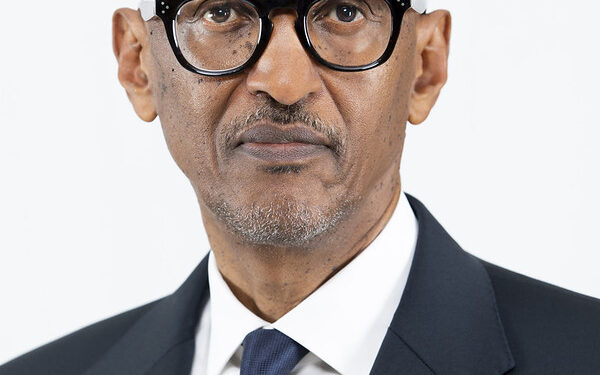Introduction
Paul Kagame, born October 23, 1957, in Tambwe, Rwanda, has been Rwanda’s President since 2000, following his leadership of the Rwandan Patriotic Front (RPF) to end the 1994 genocide. Credited with transforming Rwanda into a stable, economically vibrant nation, Kagame’s policies—emphasizing discipline, anti-corruption, and development—have sparked debates in Nigeria about effective governance. His Vision 2020 program, lifting 1 million Rwandans out of poverty, inspires Nigerian leaders like Peter Obi and Nasir El-Rufai, who cite his model for infrastructure and accountability. Despite criticism for authoritarianism, Kagame’s 2018 African Union reforms and Nigeria visits, like the 2019 Africa Investment Forum, have fueled discussions on leadership, earning him admiration and scrutiny in Nigeria’s policy circles.
Early Life and Education
Born to a Tutsi family, Kagame fled Hutu violence to Uganda at age two during the 1959 Rwandan Revolution, growing up in refugee camps. Educated in Uganda, he attended Makerere University but left to join Yoweri Museveni’s rebel army in the 1970s. Kagame trained at the U.S. Army Command and General Staff College in Fort Leavenworth, Kansas, in 1990, gaining strategic expertise. His refugee experience and military discipline shaped his vision for a unified Rwanda, resonating with Nigerians addressing ethnic tensions.
Political and Military Career
Kagame joined Museveni’s National Resistance Army in 1981, fighting in the Ugandan Bush War, becoming chief of intelligence after Museveni’s 1986 victory. In 1990, he took command of the RPF after the leader Fred Rwigyema’s death, leading a Tutsi-led invasion to reclaim Rwanda. After the 1994 genocide, killing 800,000 Tutsis and moderate Hutus, Kagame’s RPF captured Kigali, ending the slaughter. As Vice President and Defense Minister (1994–2000), he rebuilt the army, and in 2000, became President after Pasteur Bizimungu’s resignation.
Kagame’s presidency has driven 7.6% annual GDP growth (2000–2023), with initiatives like universal healthcare covering 90% of Rwandans and 64% female parliamentary representation, the world’s highest. His 2015 constitutional amendment, allowing a third term, led to 99% electoral victories in 2017 and 2024, though Human Rights Watch cites opposition suppression. His regional interventions, like backing rebels in the DRC, draw criticism, but supporters argue they protect Rwandan security.
Influence on Nigerian Governance Debates
Kagame’s disciplined governance inspires Nigerian reformers. His anti-corruption measures, making Rwanda Africa’s second-easiest country for business, are cited by Nasir El-Rufai, who modeled Kaduna’s infrastructure on Kigali’s cleanliness. Peter Obi, in a 2023 Vanguard Nigeria interview, praised Kagame’s education investments, urging Nigeria to emulate free schooling. Kagame’s 2019 visit for the Africa Investment Forum, meeting President Buhari, sparked debates on privatization. His 64% female representation influenced Nigeria’s 2023 Gender Bill push.
Nigerian critics, like Obadiah Mailafia in a 2017 TheCable article, debate Kagame’s authoritarianism, noting press repression—eight journalists killed or missing since 2000. Yet, supporters on X argue his results justify his methods. His 2018 AU reforms, streamlining budgets, inspired Nigeria’s Oronsaye Report on government efficiency. Youth groups like Nigeria’s Not Too Young to Run, training 5,000 candidates, draw from Kagame’s Youth Connekt model.
Philanthropy and Advocacy
Kagame’s Imbuto Foundation, launched in 2001, supports education, providing 10,000 Nigerian scholarships via AU partnerships. His $1 million donations to the WHO, including Nigeria’s polio eradication, bolster health systems. As AU Champion for Domestic Health Financing (2018–2021), he influenced Nigeria’s 2022 Health Insurance Act. His “Visit Rwanda” campaign, raising $400 million in tourism, inspires Nigeria’s tourism boards.
Recognition and Legacy
Kagame’s honors include the Mo Ibrahim Prize (2009), AU Leadership Award (2018), and Nigeria’s 2019 African Governance Award. Named Time’s 100 Most Influential People (2004, 2010) and Forbes’ Most Powerful African (2015–2020), he holds 10 honorary doctorates. The Kagame Leadership Centre in Lagos, opened in 2020, trains 2,000 policymakers. His $10 million net worth funds advocacy, though critics note his DRC involvement.
Personal Life and Challenges
Kagame married Jeannette Nyiramongi in 1989, raising four children in Kigali. A Catholic, he lives modestly. Accusations of assassinating dissidents, like Patrick Karegeya in 2014, and the DRC conflicts, costing 5 million lives, shadow his tenure. In Nigeria, some, like @ChidiOdinkalu on X, criticize his anti-corruption rhetoric amid elite wealth. Yet, his 2019 Doha Forum stance against Western democratic models inspires Nigerian sovereignty debates.
Conclusion
Paul Kagame’s transformation of Rwanda into a beacon of stability and growth fuels Nigerian governance debates, inspiring leaders to prioritize accountability and infrastructure while sparking controversy over democratic costs. His Nigerian visits and AU reforms amplify his influence, shaping policies from gender equity to anti-corruption. As The Economist noted in 2021, “Kagame’s Rwanda is a model and a warning.” His legacy in Nigeria—through inspired reforms and heated debates—bridges Rwanda’s disciplined vision with Nigeria’s quest for effective leadership.
Sources: Wikipedia, Britannica, The Guardian Nigeria, Vanguard Nigeria, ThisDay Nigeria, Punch Nigeria, Premium Times, Sun News, BBC News, The New York Times, Reuters, World Bank, UN Women, Human Rights Watch, TheCable, Le Monde, Politico.


















